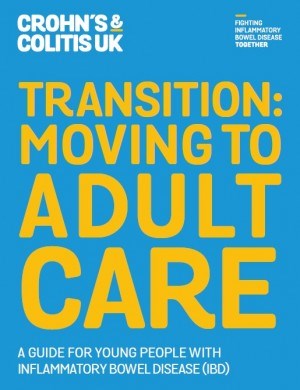If you’re a teenager with Crohn’s Disease, Ulcerative Colitis or another form of Inflammatory Bowel Disease (IBD)then an important milestone for you will be your transition to adult care.
This often happens around the age of 16 and 18, but it can sometimes be earlier or later. You might be feeling nervous about this and that’s totally normal. But we know that it can help to find out more about what’s involved and how you can get ready for the change.
That’s why we’ve written this new booklet with the support of young people who’ve been where you are now (and their parents!) They shared their stories with us so we could give you tips to make transition easier.
New guidelines from the British Society of Gastroenterology say that transition should be a gradual process that your IBD team help you prepare for.
Our new booklet about transition can also make sure you’re prepared – we’ve included tips about how you can become more confident at managing your IBD as well as ways to look after yourself – we know that leaving your paediatric team can be a stressful time for some.
I feel a bit sad, because I’ve been with my doctor since I was 10, he knows me and I feel like I have built trust.
Harry, 16
Diagnosed with Crohn’s Disease in 2011
We have also covered what it might be like to have your treatment in the adult IBD team, including appointments, having an endoscopy and staying on an adult ward. We hope this information will reassure you and give you ideas for more questions you can ask your IBD team.
This guide will be useful for parents and carers or children with IBD too – transition can be hard for them as well!
I’ve slowly grown more independent. But it’s taken many years and work between me, the staff and my mum
Nick, 21
Diagnosed with Ulcerative Colitis in 2006
This booklet was made possible due to the support of the Catherine McEwan Foundation - who had no input into the design or content of the guide.
More information
We have more than 40 publications focusing on many aspects of Inflammatory Bowel Disease (IBD).
All of our booklets and information sheets are written and produced with the help of medical advisers, nurses, other specialists and people with IBD. We are a certified member of the Information Standard scheme.
Our accreditation means that we have passed a rigorous assessment to ensure that our information is:
- Clear
- Accurate
- Balanced
- Evidence-based
- Up-to-date


